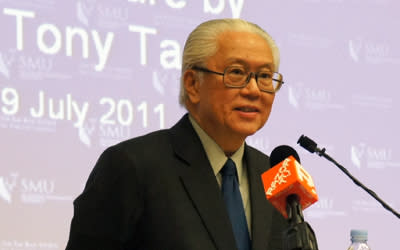Tony Tan on education: S’poreans first, not S’poreans only

After being asked "more than once in recent weeks" whether he favours a "Singaporeans first" policy in higher education, Presidential hopeful Dr Tony Tan made it clear on Tuesday that he does.
"What I understand by this is that Singaporeans can be put first. Whatever initiatives we launch, we must always put the interests of Singaporeans and Singapore first," said Dr Tan, speaking at the Singapore Management University on the future of higher education.
The former Deputy Prime Minister cited how citizens have priority entrance to primary and secondary school, and have access to subsidies and scholarships for higher education here or abroad.
"But 'Singaporeans first' is different from saying 'Singaporeans only'," noted Dr Tan. "Singapore is an international city and it would be a grave mistake to close our doors."
Since his announcement to run for Presidency, Dr Tan has been criticised by netizens for his policies during his term as Education Minister. They argued that he pursued a policy that increased the intake of foreign students in the universities.
Dr Tan pointed out that some people believe Singapore's higher education sector should only educate Singaporeans. But this would limit the talented individuals who contribute much to Singapore, he said.
And other than restricting Singapore's ability to engage in collaborative research, which has propelled local universities to the "very top ranks of universities in the world", closing the doors to foreigners also prevents Singapore from positioning its institutions of higher education as part of a global network and securing relations with other countries, he added.
"To ensure that Singaporeans can take advantage of opportunities, the government should continue to monitor carefully the proportion of foreign students in our education institutions to ensure that the proportion matches the present and future needs of the country, and the Singaporeans are the main beneficiaries of our education policy," said Dr Tan.
Reflecting on Singapore's past, present and future in higher education, Dr Tan said the government has a more difficult task in the years ahead.
"Up to now, we had role models. ... Today, we are no longer playing catch-up with Britain, the United States or anyone else. Today we are charting our own path," he explained.
He outlined three principles that he hopes will guide the next phase of developing higher education in Singapore.
They are: a comprehensive approach to education, flexibility and openness to new ideas.
They are necessary for Singapore's continued growth and will "enable all Singaporeans to set and achieve their own goals, to dream big and to live out those dreams", he said.
Dr Tan also responded to questions from the audience.
He agreed on the need to improve on the education for the handicapped and those who have suffered injury and noted that private education has its place in Singapore "if it's well run and courses are well taught".
He did not respond directly to a question on whether there were any wrong turns or right decisions made in higher education in the past. While everybody makes mistakes, it's always better to look ahead to meet needs and solve problems, while having "a sense of history", said Dr Tan.
Quizzed about his thoughts on the Presidential salary, he said he did not want to "pre-empt" the decisions by the committee reviewing ministerial and presidential salaries and he would abide by their decision.
Dr Tan was later queried by reporters on why he only spoke out publicly against the 1984 Graduate Mothers Scheme --which gave graduate mothers the priority in registering their children for school -- after it had been rolled back.
Dr Tan said it was one of the first issues he took up after he became Education Minister in 1985 as it was not fulfilling its purpose.
When asked about his stand in 1984, he said, "I see little benefit in going back to say what might have happened. The point is, one looks at the issue when one has the authority to do something about it. The important thing is that when you have the authority, you should exercise it wisely, not in a hurried way, but after due deliberation."
"I'm particularly happy I was able to persuade my colleagues in Cabinet to change course," he added.
Noted Dr Tan, "While a President doesn't have executive authority, through his influence, through the areas that he concentrates on, through the cause that he champions, he can make a great impact. And in the area of education this is particularly true."

